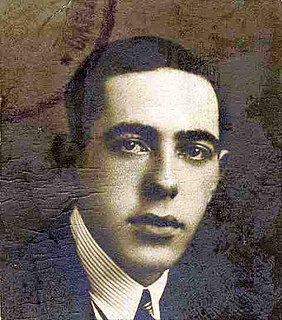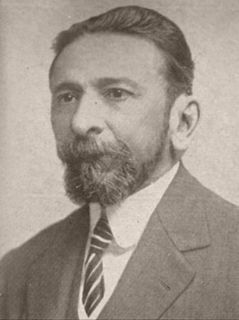
Joaquim Maria Machado de Assis, often known by his surnames as Machado de Assis, Machado, or Bruxo do Cosme Velho, was a pioneer Brazilian novelist, poet, playwright and short story writer, widely regarded as the greatest writer of Brazilian literature. Nevertheless, Assis did not achieve widespread popularity outside Brazil during his lifetime. In 1897 he founded and became the first President of the Brazilian Academy of Letters. He was multilingual, having taught himself French, English, German and Greek in later life.

Otto Maria Carpeaux, born Otto Karpfen, was an Austrian-born Brazilian literary critic and multilingual scholar.
Zélia Gattai Amado de Faria was a Brazilian photographer, memoirist, novelist and author of children's literature, as well as a member of the Brazilian Academy of Letters. Gattai wrote 14 different literary works, including children's books and her own personal memoirs have been widely published.
Parnassianism was a French literary style that began during the positivist period of the 19th century, occurring after romanticism and prior to symbolism. The style was influenced by the author Théophile Gautier as well as by the philosophical ideas of Arthur Schopenhauer.

Adonias Aguiar Filho was a novelist, essayist, journalist, and literary critic from Bahia, Brazil, and a member of the Academia Brasileira de Letras.

Jorge Mateus de Lima was a Brazilian politician, physician, poet, novelist, biographer, essayist, translator and painter. His poetry was initially composed in Alexandrine form, but he later became a modernist.

José Lins do Rego Cavalcanti was a Brazilian novelist most known for his semi-autobiographical "sugarcane cycle." These novels were the basis of films that had distribution in the English speaking world.
Gabriel Soares de Sousa (1540–1591) was a Portuguese explorer and naturalist. A participant in Francisco Barretos Africa expeditions, he settled in the Portuguese colony of Brazil living there for seventeen years. He wrote Tratado Descritivo do Brasil, published in 1587. This part encyclopaedia and part personal narrative describes flora and cultivated plants, gives an account of the culture of cotton, the medicinal qualities of tobacco and the so-called “trees reaes” or royal trees, trees of commercial value. It also covers native tribes. In 1591 he led an expedition along the São Francisco River.

Luis Carlos Verzoni Nejar, better known as Carlos Nejar, is a Brazilian poet, author, translator and critic, and a member of the Academia Brasileira de Letras. One of the most important poets of its generation, Nejar, also called "o poeta do pampa brasileiro", is distinguished for his use of an extensive vocabulary, alliteration, and pandeism. His first book, Sélesis, was published in 1960.
A Escola is a Portuguese-language novel by Miguel M. Abrahão. It was first published in Brazil in 1983.
Pássaro da Manhã is a theatrical one-act drama, written by Miguel M. Abrahão in 1978 and staged several times in Brazil. It was published in book form in 2009.
Adolfo Vítor Casais Monteiro was a Portuguese essayist, poet and writer.

Luiz Fernando Ruffato de Souza is a contemporary Brazilian writer. An alumnus of the Federal University of Juiz de Fora in the Brazilian state of Minas Gerais, Ruffato worked as a journalist in São Paulo and published several fiction books including Historia das Remorsos e Rancores (1998) and Eles eram muitos cavalos [They were Many Horses] (2001). The latter book garnered the APCA literary prize.
The Porn Art Movement was a transgressive Brazilian avant-garde movement that started in 1980 and ended in 1982. The movement took place under a military dictatorship and pioneered the use of pornography both as a form of political resistance and as an innovative art medium. The movement was formally experimental, politically progressive and socially non-normative. It used the word “porn” deliberately but it did not produce conventional pornography. Rather, it rejected erotica, which was accepted by the dictatorship, and subverted the logic of pornography to create social, political and aesthetic alternatives that employed humor, scatology, surprise, poetry, performance, body politics and pansexuality. Organized and coordinated activities ended in 1982, but isolated performances were realized and publications came out until 1984. The book Antolorgia, published in 1984, was the last publication of the movement.

José Veríssimo Dias de Matos was a writer, educator, journalist, literary critic, and founding member of the Brazilian Academy of Letters.

Tristão de Alencar Araripe Júnior was a Brazilian lawyer, literary critic, and writer.
Beatriz Francisca de Assis Brandão was a Neoclassical or Arcadian Brazilian poet, translator, musician, educator and early feminist. One of the few prominent female intellectuals and artists in Brazil during the reign of Pedro II, she became well-known for her poetry, frequently published in Brazilian newspapers. Through her life and work, she challenged the dominant societal roles for women at the time and played an important part in Brazilian social, political and cultural history.

João Carlos Reiners Terron, writing as Joca Reiners Terron, is a Brazilian poet, novelist, designer and editor.

Alexei Bueno is a leading contemporary Brazilian poet. As curator, he organized more than eighty exhibitions, on Fine Arts or on the History of Literature. As editor, he published many selected or complete works of great classics of the Portuguese language, as Camões, Fernando Pessoa, Mário de Sá-Carneiro, Almada Negreiros, Gonçalves Dias, Álvares de Azevedo, Machado de Assis, Cruz e Sousa, Olavo Bilac, Alphonsus de Guimaraens, Augusto dos Anjos and Vinicius de Moraes.
Vinni Corrêa is a Brazilian poet, visual artist, and erotologist.










